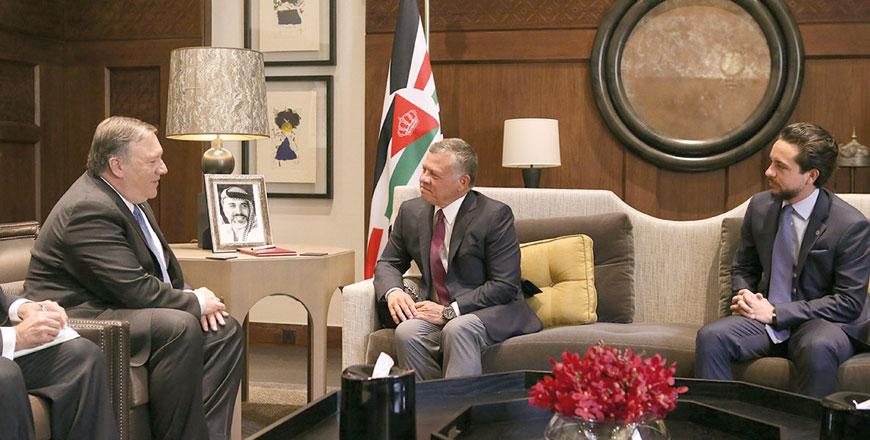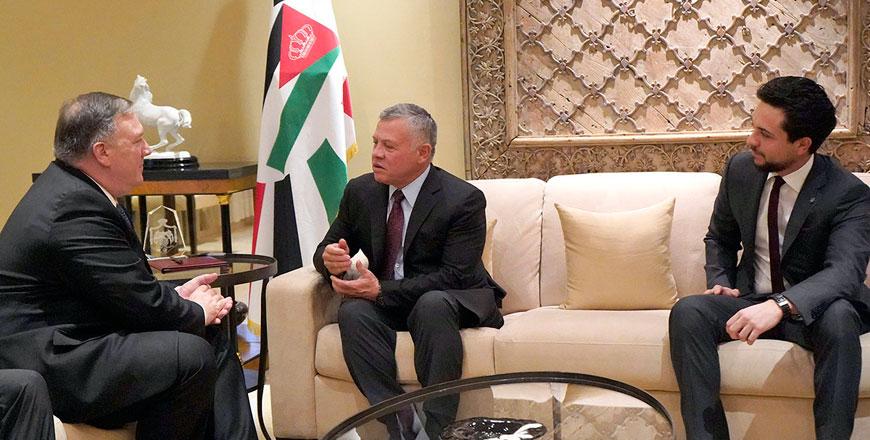You are here
Jordan, US renew commitment to ‘strong, solid’ partnership
By JT - May 01,2018 - Last updated at May 01,2018

His Majesty King Abdullah holds a meeting with US Secretary of State Mike Pompeo, attended by HRH Crown Prince Hussein, in Amman on Monday (Photo courtesy of Royal Court)
AMMAN — His Majesty King Abdullah, accompanied by HRH Crown Prince Hussein, received US Secretary of State Mike Pompeo at Al Husseiniya Palace on Monday.
The meeting covered means to advance the strategic partnership between Jordan and the United States, as well as issues of mutual interest, especially efforts to achieve peace and bolster security and stability in the region, according to a Royal Court statement.
King Abdullah congratulated Secretary of State Pompeo — who was in Jordan as part of a regional tour — on assuming office.
His Majesty also affirmed the strong ties between the two countries and expressed Jordan’s appreciation for the United States’ support for development programmes to enable the Kingdom to cope with the repercussions of regional crises.
Discussions addressed the peace process, with the King stressing the importance of stepping up regional and international efforts to relaunch serious and effective Palestinian-Israeli negotiations, based on the two-state solution leading to the establishment of an independent Palestinian state on Palestinian national soil, with East Jerusalem as its capital.
His Majesty reaffirmed that the two-state solution is the only way to end the Palestinian-Israeli conflict, and is key to achieving security and stability in the Middle East.
The King noted the importance of the US’ role in breaking the stalemate in the peace process and achieving just and comprehensive peace in the region.
The meeting also covered developments in the Syrian crisis and the importance of supporting efforts to reach a political solution within the Geneva process that guarantees Syria’s territorial integrity and the unity of its people.
The need to maintain the de-escalation zone in southwestern Syria, which was established under a trilateral agreement between Jordan, the United States and Russia, was highlighted.
In addition, efforts to reach political solutions to regional crises and fight terrorism within a holistic approach were discussed.
Foreign Minister Ayman Safadi, General Intelligence Department Director Maj. Gen. Adnan Jundi, Adviser to His Majesty and Director of the Office of His Majesty Manar Dabbas, US Charge d’Affaires in Amman Henry Wooster and the accompanying US delegation attended the meeting.
Meanwhile, during a joint press conference with Pompeo, Safadi stressed the “strong and solid” Jordan-US ties.
“Our partnership is one of pursuit of peace and stability. We value that and we value the tremendous support the US has continued to give Jordan throughout the years,” the top diplomat said.
He underlined the memorandum of understanding the two countries have recently signed, under which Washington pledged $1.275 billion per year through 2022, assistance Safadi described as the “largest in the history” of ties between the two countries.
He said the talks he held with Pompeo focused on “many of the challenges we face and how we can continue to work together to bring about peace and stability in the region and continue to cooperate and coordinate as we try to resolve the conflicts and crises that have denied the people of the region the peace and stability that they deserve”.
“I look forward to continue working with you, sir, on building our relationship, strengthening our bilateral ties, but also strengthening our partnership, which has done a lot of good at bad times for the causes of peace, stability and security that we pursue as common objectives,” Safadi said.
He reiterated that the Israeli-Palestinian conflict is the root cause of instability in the Middle East, stressing that the two-state solution remains the only path to the just and comprehensive peace Jordan envisions.
The situation is difficult as the two-state solution is being challenged and there are many obstacles on the road to peace, he acknowledged, but “we cannot give up on our efforts to achieve peace, nor can we say there is any viable alternative that we can sustain”.
“We in Jordan are committed to doing everything we can in cooperation with our partner in the US and others in the international community to make sure that we create political horizons and move towards achieving that solution”.
Jordan and the US are also in agreement on Syria, as both sides want a political solution that preserves the unity and integrity of the country through following Geneva path and the implementation of UN Security Council Resolution 2254.
He said the de-escalation zone in south Syria is an example of successful cooperation between Jordan, the US and Russia that prevented further bloodshed and destruction in the area.
He underlined the pressures Jordan has been experiencing as a result of hosting more than 1.3 million Syrian refugees.
They also discussed the war on terror, Safadi said, emphasising that terrorists are “outside humanity” and have nothing to do with a certain region or culture.
“We fight that war in defence of our people, in defence of our security, but also in defence of our common values and in defence of the values of peace and respect that Islam embodies,” Safadi told reporterts.
Pompeo echoed similar remarks on ties with Jordan.
“I came here to signal how important Jordan is to the United States. Our partnership is essential to both countries, our friendship between America and His Majesty King Abdullah, and I wanted to come here also to reaffirm all of those ties. This is indispensable to our two nations and I think to the region as well,” he said.
Pompeo, who thanked Jordan for its regional pro-peace efforts, underlined the importance of preserving the leadership’s role as the custodians of holy places in Jerusalem.
“Throughout the Syrian crisis, Jordan has provided an extraordinary level of assistance to the Syrian people. Thank you so much. We know it’s costly and we know it’s difficult, but your leadership of your neighbours at this incredibly challenging time is extraordinary.”
On the Mideast conflict, he said Washington was still open to the two-state solution, but the parties to the conflict will make the final decisions.
He said that when President Trump announced that the US would recognise Jerusalem as the capital of Israel, he also announced that the United States is not taking a position on boundaries or borders and will support a two-state solution if the parties agree to it.
“With respect to the two-state solution, the parties will ultimately make the decision. We are certainly open to a two-party solution as a likely outcome,” he said at the news conference.
“The Israelis and Palestinians need to have political engagement. We urge the Palestinians to return to that political dialogue,” he added, without making a similar call on Israel.
Reuters underlined a previous statement by US President Donald Trump who said he would support a two-state solution, if the two sides agree, stopping short of reasserting a US commitment to eventual Palestinian statehood, a long-time bedrock of US policy. The White House is preparing a new Israeli-Palestinian peace plan, dubbed as “the deal of the century”.
Israeli-Palestinian peace talks have been stalled for years and Israel has built more settlements in the occupied territories, which it seized during the 1967 Arab-Israeli war.
Israel has also refused any right of return for Palestinians who were expelled or fled and became refugees after the country declared independence in 1948, fearing it would lose its Jewish majority.
Palestinians have rejected US peace making efforts since Trump decided to recognise Jerusalem as Israel’s capital and move its embassy to the city, wanted by Palestinians as capital of their own state.
Pompeo also made his first comments on the violence along the Israel-Gaza Strip border, where Israeli forces have killed 42 Palestinians since protests began on March 30 and injured some 2,000 by gunfire. No serious casualties have been reported on the Israeli side.
“We do believe the Israelis have a right to defend themselves,” he said.
Related Articles
AMMAN — His Majesty King Abdullah’s meeting with US Secretary of State Mike Pompeo on Tuesday, attended by HRH Crown Prince Hussein, covered
AMMAN — Foreign Minister Ayman Safadi on Tuesday said that Jordan is keen on bolstering ties and cooperation with Germany in various fields,
AMMAN — Japanese Prime Minister Shinzo Abe on Friday received Foreign Minister Ayman Safadi who delivered him a message from His Majesty Kin

















